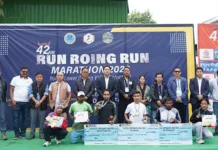ITANAGAR, Oct 12: Chief Minister Pema Khandu launched the ‘Sankalp Se Siddhi’ program for Arunachal Pradesh at State Banquet Hall.
‘Sankalp se Siddhi’ – Attainment through Resolve – is a five year plan and brainchild of Prime Minister Narendra Modi that aims at good governance under the New India Movement 2017-2022. The New India Movement envisages India free from poverty, corruption, terrorism, communalism, casteism and un-cleanliness and unite the entire country by adopting good governance using technology.
Speaking on the occasion, Khandu said that Prime Minister Narendra Modi is concerned about proper implementation of central government flagship programs at the grass root level and therefore has made a pledge to take all welfare programs to the doorsteps of the people.
“The Central and State governments have launched several pro-people programs and schemes but somehow we are failing to take these to the intended beneficiaries to the rural areas and the poor,” he said.
Khandu informed under the ‘Sankalp Se Siddhi’ program, the state government will create awareness amongst the people and create facilities to make them avail all welfare schemes.
For this the state government has constituted district-wise committees to be headed by a legislator with a Secretary level officer that will reach out to villages and aware the people of the central and state government flagship programs in close coordination and support of respective district administrations.
“We are a state with a small population. If we all – the legislators and officers – come together as Team Arunachal, we can reach every household of the state and see to it that every individual is benefited by the various flagship programs,” Khandu observed.
He called upon his legislator colleagues and officers entrusted with the district committees to get active immediately after the ensuing Assembly session (from 13 to 18 Oct) and tour their respective districts.
Khandu appreciated the role of government officials and acknowledged their contributions in paving way for rapid development of the state on all fronts. He said, the work culture in government offices has changed drastically and the change is visible in the output of service delivery.
Under the ‘Sankalp Se Siddhi’ program, the state government has framed a timeline according to which, from 13 Oct to 14 Nov, 2017 the district committees will visit their respective districts and conduct massive IEC programs on all flagship schemes, reports will be submitted to the state government by concerned secretaries between 16 to 30 Nov 2017 followed by presentations by concerned secretaries from 1 to 7 Dec 2017.
Secretary in-charges will brief about all the schemes to HoDs in meetings to be chaired by the respective deputy commissioners, who will ensure at least five master trainers to disseminate information in various circles and villages. Each DC will hold administrative camps in all circles before 30 November 2017 that will cover immunization, issuance of caste certificate/aadhar cards, PM Jan Dhan Yojana, dissemination of forms for all important schemes, etc. It has been mandatory that each secretary will visit at least five schools, hospitals, banks, anganwadi centers, PDS outlets, etc in their designated district.
The report to be submitted by the secretaries would contain the following: field visits to schools, hospitals, banks, anganwadi centers, PDS outlets, etc, field visit to key infrastructure project in the district, current performance of the district on 23 listed schemes, areas where performances are not up to the mark, details of master trainers and IEC activities carried out in the district, any innovative activity carried out in the district and any scope of improvement in execution of schemes.
Meanwhile, Khandu along with Deputy Chief Minister Chowna Mein, Education and Libraries Minister Honchun Ngandam, state BJP President and former MP Tapir Gao and Chief Secretary Shakuntala D Gamlin released a book on ‘Complete Works of Pt Deen Dayal Upadhyay’. The book would be dispatched to all state government libraries, schools, colleges, universities and public institutions across the state. (CMO)


